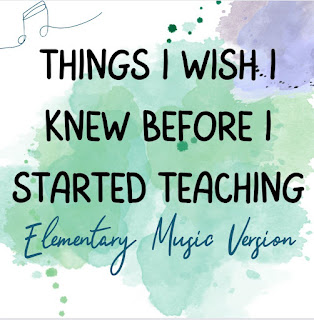There are SO MANY things I wish I knew...
...before teaching Elementary Music
Firstly, my degree is in music education with an instrumental focus. My Type 10 certification permits me to teach K-12 music classes.
ANd ya know what? That's ridiculous.
The skills required to corral 5 year old children whose enthusiasm for noise knows no bounds & the knowledge of alternate fingerings, competitive marching band drill arrangement, & advanced vocal techniques for high school ensembles are not even remotely close to the same.
Seriously. Not. even. close.
My classes taught me about music history & the old dead dudes who wrote it. I learned about perfect 4ths and the theory behind parallel 6ths. I learned to play woodwinds, brass, percussion, and strings, & even passed straight out of keyboard skills.
I took 1 class - yes, you read that correctly - 1 class on elementary music education. During that time I learned there were standards of music education, someone named Orff, and that Kodaly method used solfege. The only song I was taught was "Chatter with the Angels" which we learned how to teach by rote.
All the other stuff came through workshops and reading music blogs like this one. I'm hoping to spare you all some of the shock:
#1 - Content comes 2nd
I naively believed that all of class was going to be about music; songs we sang, instruments we played, & the music we created together.
Then I had children come into the classroom. They wiggled their bodies (and teeth) straight into my heart, but I had to 1st make connections with them.
The songs I choose now are relating to my students, their cultures, holidays, & homeroom content. If my curricular objectives are to teach La, Sol, & Mi, I can pick any number of songs. Let's say the kids are studying bugs in science. Picking "Snail, Snail" enhances both curriculums by allowing students to make natural connections.
#2 - If you're early, you're on time.
School may start at 8:15 with contract hours beginning at 8:00am, but pulling into the parking lot at 8:00 is not sufficient.
Prepping for tomorrow at the end of each day is certainly helpful, but tiny humans with bundles of energy need a teacher that matches. Taking time at the start of each class period to get out materials, figure out the tech, and then start class is the recipe for a disaster!
Set yourself up for a great day by arriving early. When early is your default for on time, you won't be running late!
#3 - Make peace with imperfection
Lessons will not be perfect & nor will you. For that matter, your students wont be either. So let go of the pressure you're putting on yourself and try to make peace with imperfection.
Growth Mindset is key. By modeling this for kids, they'll begin to adapt this frame of mind, too.
As musicians, this is best illustrated in rehearsals. We practice over & over so that our performances showcase the best of the best. There will always be opportunities to reflect on your music curriculum & evaluate your lessons.
#4 - Teaching Take a Toll
Parents often presume we're extroverts & treat us as though we're impervious to criticism, exhaustion, or vocal strain.
Without taking care of our bodies - especially our vocal chords - we will be down for the count. Losing your voice is painful but doesn't have to be a part of the job.
And if you haven't learned this yet, making music sub plans are hard. Read more about making a spectacular sub tub here.
#5 - Always advocate
People don't know what happens in your classroom, and often times their assumptions are outdated, misguided, or informed by their own biases.
In my 1st year, I had a fellow educator tell me they wished they could just sit around playing games on the floor with kids all day. It was intended as an underhanded compliment, but luckily I had witty remarks stowed in my back pocket for occasions such as this. And if he wanted to play games with his students, he could sit his 3rd grade teacher butt down and do so. Kids love games!
Having colleagues not understand what happened in my classroom took education. I'd often review material as students lined up so that their teacher would hear.
Advocating to parents was a bit more predictable, but required more planning & structure. Sure, there were concerts and performance opportunities, but what about all the little moments? The first time a shy student sings a solo or when a student struggling with dysgraphia discovers a strategy that helps them read notes on the staff? I've found that newsletters help! Snag your copy of this editable news letter here.And remember, music matters. You're not a babysitter, a glorified sub, or someone else's prep time. You are the reason children come to school, the safe space for so many, and a key ingredient in teaching the whole child!
What's next?
If you haven't yet landed a music education job yet, here are some tricks & tips to help you get your dream job!
For those that have dipped their toes into the teaching waters, tell me what you'd add to this list in the comments below!
Musically,




Comments
Post a Comment
If you have a Google account (such as Youtube, Gmail, Google Apps, Google+, Blogger), feel free to leave a comment or words of encouragement here! If you don't have a way to sign in, you can still leave a message on the main page under the 'Leave Jaime a Message' title on the right side of the page, below the calendar!